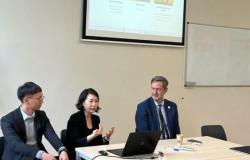University
Outgoing minister Robbert Dijkgraaf during a visit to Groningen Photo Reyer Boxem
‘Enjoy what you can do today’
Outgoing minister Robbert Dijkgraaf during a visit to Groningen Photo Reyer Boxem
Robbert Dijkgraaf looks back on his time as education minister during an afternoon of shaking hands. ‘You can’t just turn internationalization off for three years and then turn it back on and hope that everything still works.’
By Bas Belleman, Higher Education Press Agency (HOP)
April 23 at 2:45 PM.
Last modified on April 23, 2024
at 5:01 p.m.
April 23 at 2:45 PM.
Last modified on April 23, 2024
at 5:01 PM.
Education Minister Robbert Dijkgraaf seems to be in a good mood always and everywhere. Today he is in a community center in Nieuwegein, where he will soon receive a report. He happily chats with administrators, students and researchers.
He hardly notices that these are turbulent times. The government has fallen, there have been elections, no one can predict what will happen next. Perhaps Dijkgraaf will continue to rule for months to come; it could also be over tomorrow.
How does he deal with that? What does a minister do when every day could be his last? Why does he then drive the official car to a community center in Nieuwegein to receive a report there? And why is he going to award an award to the teacher of the year later today?
We follow him for an afternoon. It’s a bit like going out with Sinterklaas. All eyes are on him, Dijkgraaf is the guest of honor and he plays that role with verve. He nods when someone says something sensible and laughs after jokes.
He is a minister and distributes many hundreds of millions, he sets out policy that will determine the course of higher education and research for years to come. But he still suggests that he is an outsider who has become a minister by chance and is carrying out his task to the best of his knowledge.
You are outgoing and it is already the end of March. Did you think it would take this long?
‘To be honest, yes. The elections were at the end of November and there will not be a new cabinet before Christmas. So I knew that we would come approximately this far. I started writing things in pencil in my diary again for March and April.’
I started writing things in pencil in my diary again
What has it changed for you?
‘I never really had the feeling that I was really outgoing. I even found it somewhat liberating. We were very fortunate that we were able to put quite a few things into motion before the government fell. The extra money for education and research, the basic grant… a number of big things were done before July 1 last year. I felt: wow, I put the plants out in the garden and now I have to take good care of them for a while.’
Will the next government also do that?
‘That is of course the big concern. You don’t know that, but every day that the plants get water and can continue to grow undisturbed is one day. Someone said: when you are a caretaker, you govern as if every day is your last. That does provide focus.’
Dijkgraaf comes across so calm and carefree that you would almost forget what problems are going on. He has just apologized on behalf of the cabinet for indirect discrimination by student financier DUO in the fight against abuse of the basic grant for people living away from home. This mainly included students with a migration background.
‘We often talk to umbrella associations, who talk to administrators, who talk to courses… There are easily five or six layers in between before you get to the teacher and student. While that is an important part of equality of opportunity: how is it shaped for the individual student? Lower probabilities add up. You have a migration background, your parents do not speak Dutch, you have to make ends meet… To help such students, we will simply have to do something extra.’
‘Equality of opportunity does not mean saying that the door is open. If you have to come from far away, sometimes you can’t even reach the door. There are ditches in between, someone has to help you across them. This requires targeted policy and yes, that is very tough. Everyone has the best intentions, including in politics and ministries. But ultimately we depend on teachers and staff who say: I’m going to make a difference.’
The minister must move on to the next event, the awards ceremony. We can ride along. In the back seat of the official car he says something that may explain his imperturbability.
No one in my family has ever gone to college
“No one in my family has ever been to college. I had no idea what a university would look like, but I had an image in mind. To be honest, that was not the image of a campus full of concrete new construction. And twenty years later you walk through Princeton and you think: this is exactly how I imagined it. I saw trees and turrets. I told that this morning to a young scientist who is writing a book about choices in your scientific career.’
What could you tell that scientist about making choices?
‘My message was that you have an internal compass that points the way: that’s what I want to become, that’s what I want to do something with. That could be very far away. The other thing is that you have to be in the here and now. For me it was a revelation in my scientific research that I didn’t have to think too much about what I was going to do next year, or the year after that.’
And does that also apply to a minister?
‘Of course. There are big policy goals far away, but you also have to enjoy what you can do today. The in-between area is dangerous, because that is where the things you actually have no control over are located, while you can worry about them. I think that’s where a lot of stress comes from. Stress is not beyond the horizon, but neither is it in the here and now.’
When you became minister, you said that sometimes – just like in science – you have to wipe the whiteboard clean and ask the question: what are we doing? Have there been enough times when you were able to do that?
‘No, too little. But I’ve done it a few times and still think it’s a good idea. Legislation and policy are quite complicated. Everything takes a very long time and moves very slowly. You can take a few weeks longer, but stick it at the beginning.’
Then we are already in chapter seven, never at the beginning of the story
Why couldn’t you do that more often?
‘As a minister you are handed all kinds of books, so to speak, and we are already in chapter seven, or if you are lucky in chapter three, but we are never at the beginning of the story. Things have already been done, there is already policy in place, there is already a coalition agreement or whatever. It is sometimes difficult to explain such a policy. When researchers tell me what they do in a scientific article, my first question is: why do you do that? What is actually the question we are answering? You want to hear that first. Such a thing is difficult in terms of policy and it is not in the thinking of the ministries.’
Slowness is one of the major criticisms of your internationalization policy. You hear that accusation every time. Does that have to do with wiping the whiteboard blank?
‘There was already a bill in the Senate, Language and Accessibility, and that is precisely why I did not allow it to go through. I wanted to know: what problem are we solving? What does our thinking about internationalization entail, other than calling for ‘more instruments’ and ‘fewer students’? I didn’t get a good answer to that, so I said, sorry, I just want to think about it a little longer. What are our goals, what are our resources, how do we want to organize it? It takes time to carefully analyze it step by step, but we did it anyway. That was really important.”
The VVD submitted an amendment during the budget discussion to enable a numerus fixus for English-language courses. Did you think that was too hasty?
‘With the Internationalization Act in balance, we are looking for nuance, so that takes a little more time. I often compare education policy with open-heart surgery: it must continue to work. You can’t just turn internationalization off for three years and then turn it back on and hope that everything still works. There is a lot of debate about it, also in the press, there are all kinds of opinions, and that is good, because then we go beyond the clichés. Let us not make the mistake of linking internationalization directly to the migration discussion, because it is really something else. But we do have to deal with issues of financing and capacity.”
The driver parks the car at the back of a theater, where chairman Demi Janssen of the Intercity Student Consultation (ISO) receives the minister. He transitions effortlessly small talk. They recall a dinner at the ISO, where the minister was allowed to uncork a champagne bottle with a sword. “The whole bottle exploded,” Dijkgraaf laughs.
Education policy is like open-heart surgery: it must continue to work
The meeting for the election of the Teacher of the Year is in full swing in the theater hall. Three of the four candidates have already given a small lecture, the fourth is in progress when the minister enters and sits in the front row.
Of course the presenter asks him questions and then he plays exactly the role he described earlier: he encourages the people. “Being a teacher is what I missed most in my ministry,” he says. ‘Teaching is something that gives you a lot of self-care. You simply learn the most from your students.’ When he says it, it doesn’t sound hollow, but it is of course an open shot in a room full of students and teachers.
Dijkgraaf then presents the prize and has his picture taken with the winner. All kinds of students and teachers approach him. He seems to bewitch them all. At the drinks, one former Teacher of the Year sighs to the other: ‘What a pity that he will not remain a minister.’
This year’s winner also likes Dijkgraaf to be at the ceremony. “I can imagine that he is very popular as a minister, just because of who he is,” he says. ‘He is someone with a certain charisma, who speaks his words well. And he is intelligent. Theoretical physics is something we don’t understand.’
Dijkgraaf likes to put this into perspective. According to him, the awe lies less with the person than with the ministership itself. “People sometimes ask me whether they should say ‘je’ or ‘u’,” he says. ‘Then I answer: try saying ‘you’, you won’t succeed. You say ‘you’ to the office. The office is much bigger than myself.’
It won’t stick around for long. He could talk for hours, or at least gives that impression, but his spokesperson takes him away. He has to go to the next conversation. Dijkgraaf walks away briskly, as if nothing can tire him.






